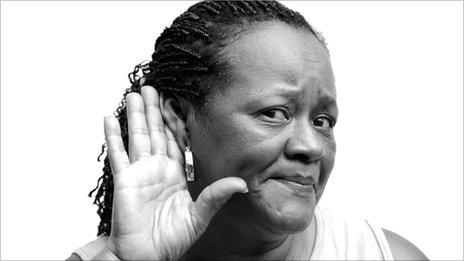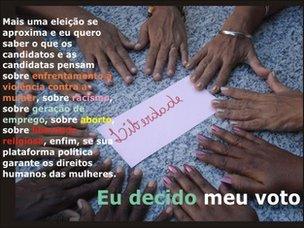Brazil's women voters campaign to be heard
- Published

I'm listening: Edclea Santos wants to know what candidates have to offer
Edclea Santos has a generally negative view of politicians. It is only every four years that most pay any attention to her neighbourhood on the outskirts of the north-eastern Brazilian city of Olinda, she says.
"Then, it rains candidates."
With presidential, congressional and state elections due on 3 October, recent weeks have seen a political deluge.
"There are those who just turn up, promise things, offer to pay people, get your vote and then you never see them again," says Edclea.
But this year she has been taking part in a project to show that the votes of women, who make up more than half the electorate, cannot be taken for granted.
Several organisations got together to teach women from some of the poorest parts of the cities of Recife and Olinda how to take photos, choose the best angles, and crop their pictures.
The best images were made into postcards to be sent to candidates asking their views on a range of issues including abortion, health, racism, crime and domestic violence.
The women were also given disposable cameras to chart their daily lives.
The next stage of their campaign, entitled "I decide my vote", was to follow up on the internet, posting a blog, external about what the candidates are saying.
They have also been monitoring candidates' comments on Twitter and checking what is being promised.
"The idea was to provoke candidates to talk about women's issues and at the same time create a culture among women to demand more from political candidates with regard to their own lives," says Nataly Queiroz from Grupo Corumim, a women's rights organisation heavily involved in the campaign.
"The photos are a way the women can show their own lives themselves, without being photographed by others or talking through others."
Life as a maid
Olinda is in Pernambuco, President Luiz Inacio Lula da Silva's home state. It is one of Brazil's poorest regions, with big disparities in income and serious social problems.
Edclea often encounters such problems in her job as a social worker. She also helps to run the women's centre in her district, known as the Little Bird Community or Comunidade do Passarinho, a collection of houses dotted up a hillside with the streets named after birds.

The women designed campaign postcards
She says the "I decide my vote" project has given them a chance to say what they want about issues that matter to them.
"Poor people don't have a voice, especially poor black women. There is the attitude of telling us to shut up, telling us we don't know anything," she says.
The situation of black women is embodied by two activists at Grupo Corumim's headquarters in Olinda.
Eunice do Monte, 67, started work as a maid when she was 12.
"I cried and cried, and begged my mother to take me home, but I had to stay. So I did."
She worked for just her food and clothing until she was 20 when she began to realise she had rights - a realisation that led her to join the domestic workers union.
Eunice is motivated by the "I decide my vote" campaign.
"Election time there is no lack of candidates asking for your vote, sending out letters, making phone calls, insisting even. This campaign shows that we make up our own minds," she says.
Forty-seven years younger than Eunice, Patricia Lima has grown up in a very different Brazil. She has been part of Grupo Corumim since she was 13 and is currently part of a local theatre group. But she knows very well what life as a domestic servant means for many women in Brazil.
"My grandmother was a maid - she started aged nine. My aunt and my mother were both maids too. If I hadn't become active politically I would probably not have realised my dream to be an actress and would have gone into domestic service."
Back in the Little Bird Community, some 15 women are gathered in a small room at Edclea's house while children play and watch television next door.
Three sewing machines line one wall - the group is running courses to teach women how to sew. The aim is to make bags to be sold as part of a co-operative and boost their incomes.
A notice board on one wall details their events, including the date and time of their appointment with the BBC.
"Our mission is to strengthen women regarding their human rights, regarding gender and race. Remember, most of the women here are black and most are the head of their families," says Edclea.
Top post
The women say that life has improved in recent years and most are full of praise for Brazil's outgoing president, Luiz Inacio Lula da Silva
"After these past eight years, you can now go into a modest house and see a big flatscreen TV, a computer. People's standard of living is a lot better," says Edclea.
"Here people have houses, sanitation, but on the other side of the river there are people living in cardboard boxes. They don't have sanitation, water, and that is a big conflict. I think what we expect from the next government, the next politicians is that they improve the lot of people on really low wages."
The 2010 presidential campaign has already been groundbreaking in having two female candidates.

Opinion polls suggest Dilma Rousseff will be elected Brazil's first female president
According to the latest opinion polls, the next president is likely to be Dilma Rousseff, of Lula's Workers Party (PT), ahead of Jose Serra of the Social Democratic Party (PSDB) and the Green Party's Marina Silva.
The women in the Little Bird community agree it will be a big change to have a woman in the country's top political post.
"I hope, if she (Dilma) does win, she'll remember who put her there, the women voters who are expecting her to do things for them," says Josiane Silva Santos, 49, a seamstress who has been teaching the others sewing skills.
Severina Tabosa da Silva, 66, is more sceptical.
"I have my doubts, because she was never poor like Lula was. Lula has done what he did because he was poor," she says.
Whatever the outcome of the 3 October elections, Edclea says she believes their political campaign will make local candidates in particular take notice of their demands.
"It has given us a chance to say what we want, and then to keep the pressure on the politicians once they are elected."